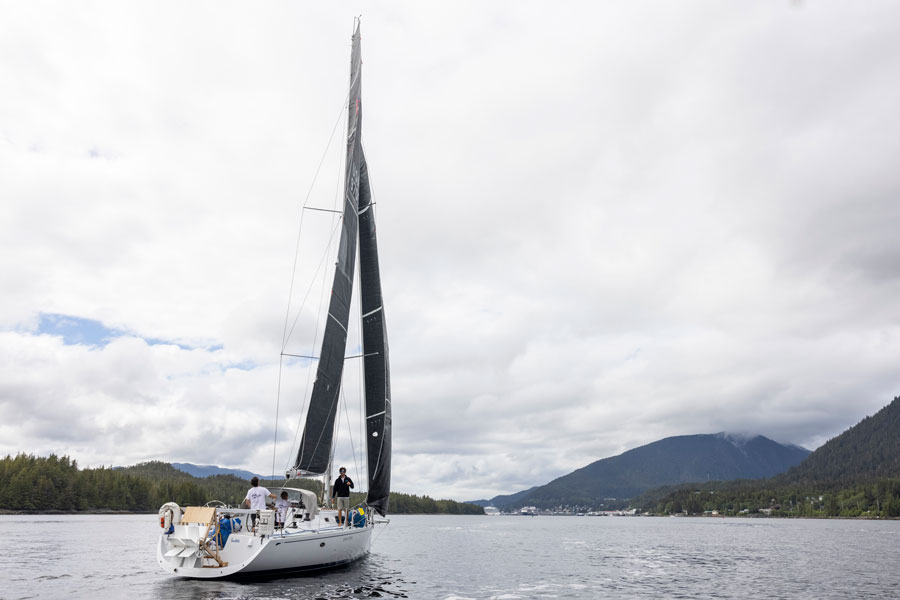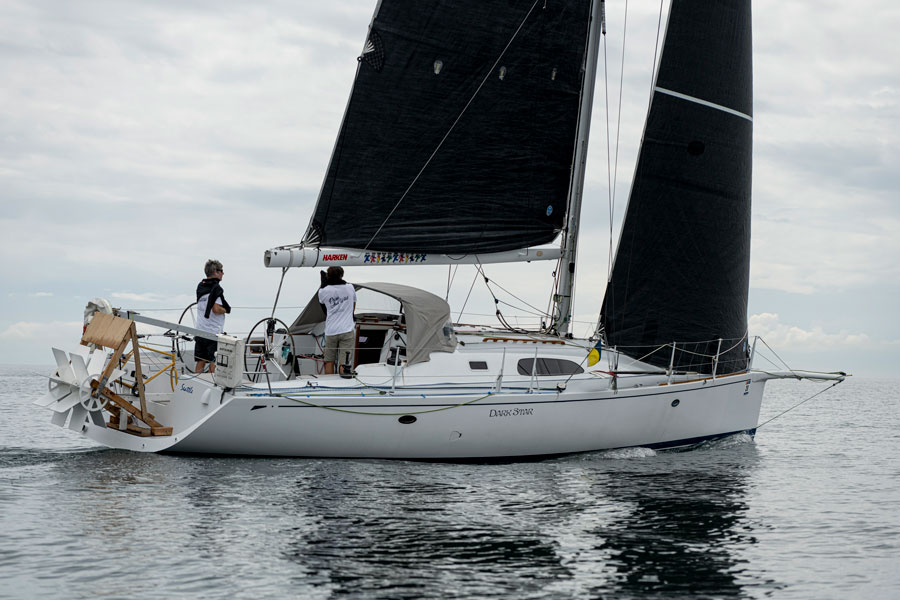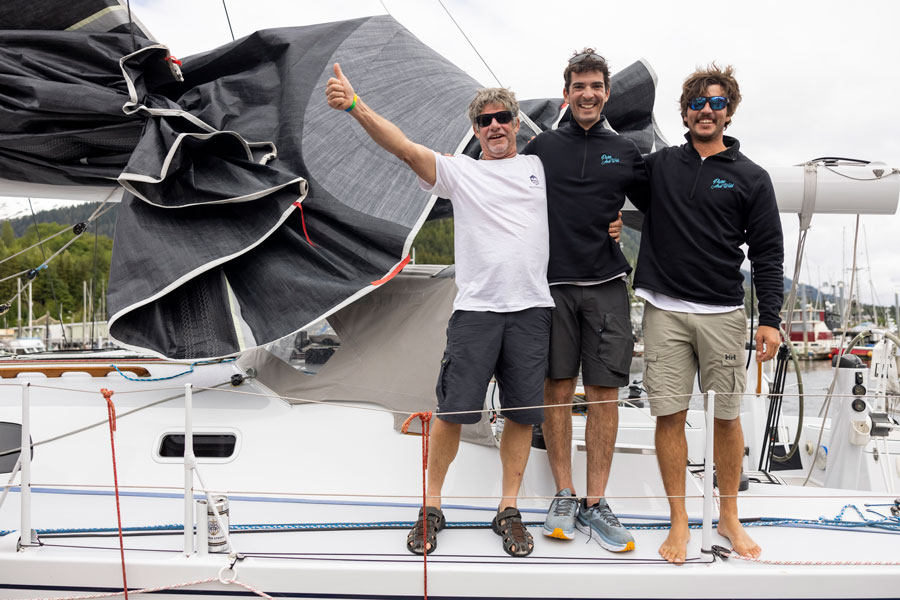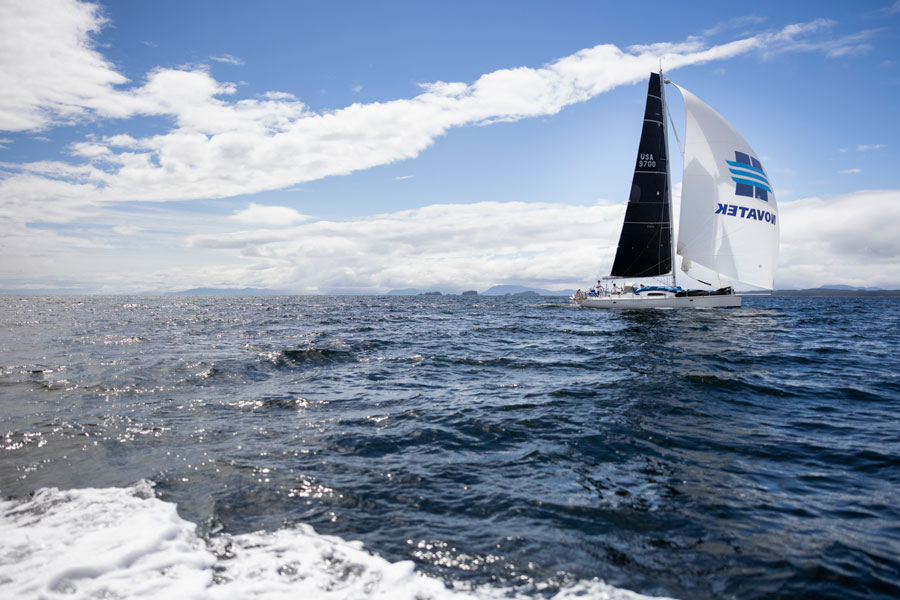By guest writer Andy Cross of 2018 Team Wild Card, and editor of 48° North magazine
Sailing fast under full mainsail, staysail and asymmetrical spinnaker, Team Pure and Wild pushed toward the finish line in the late afternoon on Monday, June 20 with breaks of blue sky overhead. Just a few miles to the northwest in Ketchikan, Alaska, a bell was waiting to be rung, the 10 grand prize to be claimed and celebratory beers to be guzzled. Race to Alaska glory was theirs.
The scene was captured on video by an R2AK media team in a chase boat and the song they chose to set that marvelous moment to on Instagram? Immigrant Song by Led Zeppelin. The volume on my phone was on high when the iconic drums of John Bohnam burst through, leading into Robert Plant’s unmistakable opening, “Ah-ahhh, ah! Ah-ahhh, ah!” It was audio-visual perfection. Man, I felt like I was there.

There’s nothing quite like that feeling of sailing across the border at Dixon Entrance and into the channels leading to Ketchikan. But for everyone who throws their hat into the R2AK ring, the experience is different. Heck, for any team to make it to this point takes a seemingly herculean effort. But to win the whole shabang takes a distinctive combination of factors: You need a fast boat. That boat needs to be sailed with exceptional skill, prudent seamanship and smart decision making. And—possibly most importantly—you need a heavy dose of good fortune to see you through to the end.
Racing for SeaShare (seashare.org), a nonprofit that works with the U.S. seafood industry to distribute seafood to food banks nationwide, Team Pure and Wild combined the talents of sailors Jonathan McKee, Matt Pistay, and Alyosha Strum-Palerm. The boat? McKee’s Paul Bieker-designed Riptide 44 rocketship, dubbed Dark Star. The good fortune?
It’s been said in ocean sailing that luck favors the prepared, but in this version of R2AK, with literal rafts of logs plaguing teams at every tack and turn, it might not have mattered how prepared you were. Yet, part of Team Pure and Wild’s preparation was to make a crucial decision that aided in their victory—they rolled the dice and went outside into the Pacific Ocean.
“We knew there would be more wind out in the ocean,” Jonathan McKee told me by phone, which data appeared to back up. “When we looked at the historical data prior to the race, the routing software told us that essentially 90% of the time it pays to go outside.”
While teams on the inside were dodging logs, plowing into them or leaping off waves on top of them, Team Pure and Wild shook off a slow start out of the Strait of Juan de Fuca before making the most of a northwesterly breeze when it finally filled in.
“The first 7 hours were tough because we had adverse current and not much wind. We expected to be pretty far behind compared to the inside boats after the first few hours. The question onboard was, ‘Can we make it up?’” McKee said.
By all accounts, beating up the west coast of Vancouver Island is no picnic, but the Riptide 44 with those three sailors aboard was probably the boat and team best suited to take that challenge head on and come out on top.

Having completed the R2AK in 2018 as part of Team Wild Card and also cruised and raced on the west coast of Vancouver Island, I watched the tracker not only with excitement, but with a knowing perspective. And when I asked about the wind and sea state on the outside, it was pretty much what I expected. McKee added, “We had some pretty rough conditions about 50 to 100 miles south of the Brooks Peninsula. One of our team members wasn’t feeling well; we were essentially racing doublehanded for a while. It wasn’t easy.”
The next challenge was to get around the infamous Cape Scott. I speculated in past R2AK musings that, if an outside team could get to the top of Vancouver Island and through the notoriously weird wind and currents at Cape Scott, there was a solid chance they’d be homefree reaching to Bella Bella and then running for Ketchikan. Some form of that came to fruition—and it was quite entertaining to follow.
McKee confirmed as much, “Nearing Cape Scott, we had 10 knots of breeze and things were pretty cruisy. Right when we got there, though, the wind died and the current was ripping against us and we struggled for about an hour to make it through to the new wind. Once we did, we had a nice night jib reaching to Bella Bella—the second half with the spinnaker.”
With my eyes alternating between computer screen and phone, this was about the point where I knew these guys would take it. Beyond the factors of boat and team, I mostly believed this would be true because in analyzing the weather on Hecate Strait for the days ahead, it appeared they’d have the most pressure and the least amount of land standing in their way. At that point, several top teams on the inside had, sadly, bowed out, and the closest teams were many miles behind.
After Bella Bella, the wind came up out of the south and southeast and Team Pure and Wild made a huge chunk of miles towards Ketchikan that night. “We reached out into Hecate Strait with the Code Zero and then put up the kite when we were able to fall off a bit,” McKee explained. “Then the wind increased to 25 knots during the night and the seas were pretty sporty for a while with big waves. We even had a high impact collision with a log…with no damage.”
Nearing the border in Dixon Entrance, the winds went light and their progress slowed, he remembered. “The sea state here was bad, not much breeze with waves coming from the west and south. Finally, we got some southerly wind and had a fantastic sail to the finish.”
Team Pure and Wild’s win was a feat that was not only fun to follow, but embodied the spirit of what the Race to Alaska is personally and as a community of racers.
In McKee’s words, “It wasn’t just about the race itself. We were in it to have some of those transcendent experiences that you can only have at sea. And we did. We came away with respect for the beauty and power of the ocean, which is only reinforced when you’re out there doing it, living it. Also, it was really cool to take part in an event that brings so many boating cultures together—the rowing, sailing, adventure communities. We have so much respect for the people on all the other boats.”
Indeed, I think we all do. Congratulations to Team Pure and Wild on an excellent race. Or, in the illustrious words of Robert Plant, “Ah-ahhh, ah! Ah-ahhh, ah!”

